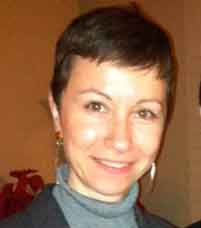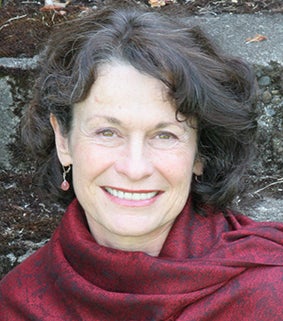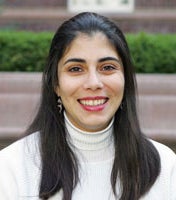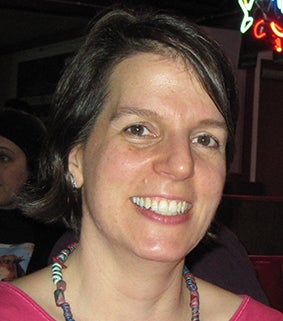Needing more time to finish her doctoral work, Jeneé Wilde in the UO's English department was thrilled to learn she is the winner of the Jane Grant Dissertation Fellowship for the 2014-15 academic year.
The fellowship, which provides $12,000 and tuition remission, is the top award given each year by the UO's Center for the Study of Women in Society. In all, 12 graduate students and eight faculty members will get grants totaling $80,000 for research issues related to women and gender.
Jane Grant, for whom the fellowship is named, was the first female news reporter in The New York Times city room and cofounder of the New Yorker and the Lucy Stone League, which sought to help women keep their maiden names after marriage. Her contributions to feminist thought are detailed on a CSWS webpage. After her death in 1972, Grant's second husband, William Harris, agreed to fund a center, the CSWS, at the UO that engaged in research on women and gender studies. Grant's papers came to the UO in 1976.
 "After this year, I no longer will have graduate-teaching fellowship funding, so the Jane Grant Fellowship is crucial to the completion of my degree," says Wilde, whose dissertation is titled "Speculative Fictions, Bisexual Lives: Changing Frameworks of Sexual Desire." She will defend her dissertation in Spring 2015.
"After this year, I no longer will have graduate-teaching fellowship funding, so the Jane Grant Fellowship is crucial to the completion of my degree," says Wilde, whose dissertation is titled "Speculative Fictions, Bisexual Lives: Changing Frameworks of Sexual Desire." She will defend her dissertation in Spring 2015.
"While studies of gay, lesbian, and transgender communities and cultural production have dramatically increased over the last two decades, research on bisexuality remains highly undervalued in humanities and a majority of social science disciplines," she wrote in her grant application.
Eleven other UO graduate students were chosen for grants, which begin at $2,400.
April Lightcap, in the psychology department's Personal Relationships, Interpersonal Stress and Mindfulness lab, will use her grant to conduct a randomized controlled study to test the effectiveness of Birth Your Way, which she developed.
"Birth Your Way is a prenatal intervention that aims to increase childbirth satisfaction, reduce postpartum depressive symptoms and increase psychological flexibility," says Lightcap, who for a decade has been working with pregnant mothers and their partners in mindfulness-based childbirth practices. "The CSWS award also will allow me to gather critical information to further develop the program and target additional health outcomes in future trials."
Tongyu Wu, in sociology, will apply her grant toward her doctoral dissertation, which considers "how and why the intersection of race and gender becomes an active part of work culture, labor politics, and productivity and discipline in a professional workplace as different groups of workers draw boundaries toward each other." Her framework focuses on racial masculinities of white and Chinese male engineers in a large high-tech company.
"The CSWS award is critical to the second phase of my research, which includes completing 30-40 interviews and a two-month participant observation on the site and a three-month data analysis on campus," Wu says. "I have completed the first phase, which involves conducting three-month ethnography and 14 interviews, negotiating entrance and recruiting further participants."

Among the eight faculty members, who will receive $6,000 each, are Theresa May, associate professor of theater arts, Priscilla Peña Ovalle, associate professor of English, and Sara Hodges, professor of psychology.
The CSWS grant to May will allow her to develop the “The Women and Rivers Project," a community-based theatre initiative by and about regional Native American women and their role in the health of the Northwest's rivers. The project is an extension of work done on her soon-to-be published book "Salmon is Everything: A Community-Based Play from the Klamath Watershed."
"This grant allows me to begin a collaborative creative project that explores the relationships -- both historic and contemporary -- of women in the Pacific Northwest to the many rivers of our region," May says. "The grant will fund the first step of this project: a residency of a prominent Native theatre artist, Muriel Miguel of Spiderwoman Theatre, who will conduct a workshop with UO students and community, building toward a collaborative theatre piece."
 Ovalle will apply her grant to project called "Media/Hair/Style," which explores the historical, industrial and cultural function of hair in mainstream media. The project, which will result in a book and multimedia, blends theory and practice in documenting the history of hair styling in the U.S. film and television industries. An interactive database also will be designed to allow users to analyze hair function as a visual convention of race, sexuality and gender.
Ovalle will apply her grant to project called "Media/Hair/Style," which explores the historical, industrial and cultural function of hair in mainstream media. The project, which will result in a book and multimedia, blends theory and practice in documenting the history of hair styling in the U.S. film and television industries. An interactive database also will be designed to allow users to analyze hair function as a visual convention of race, sexuality and gender.
"I will use the grant to attend a summer workshop on project development at the Humanities Intensive Learning and Teaching Institute at the University of Maryland in August," she says. "The remaining funding will be used to acquire visual archival assets, such as fan magazine clippings and studio photographs, that will be incorporated into a beta version of this project. This is a tremendous investment in my research and project production."

Hodges says the CSWS grant is a big boost for a complex study she is launching on why women often interpret some communications -- even some comments meant to be encouraging -- differently than men in science, technology, engineering and mathematics (STEM) fields as discouraging and lead them to leave STEM educational programs. She is focusing on how female and male undergraduates interpret feedback about their prospects for graduate school.
Women are underrepresented in STEM fields, she says, "almost certainly due to multiple factors such as a lack of role models, unwelcoming environments and a history of discrimination," Hodges says. "Together, these factors create an environment that makes women uncertain whether they belong in STEM. I hypothesize that this uncertainty negatively affects women's perceptions of the feedback they receive in STEM, which in turn may lower their intentions to persist in STEM fields, perpetuating women's underrepresentation.
"The grant is essential to run this study," she says. "I'll be using the money largely to pay our research participants. This is not a short survey study. It will require a lot of their time. I'll also use the funds to pay undergraduate and graduate students to help me collect the data."
For the complete list of winners and their project titles, see 2014 CSWS Research Grant and Fellowship Awardees.
- by Jim Barlow, Office of Public Affairs Communications

